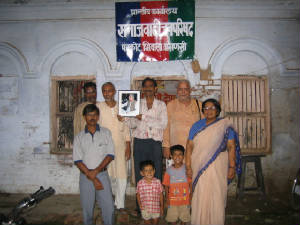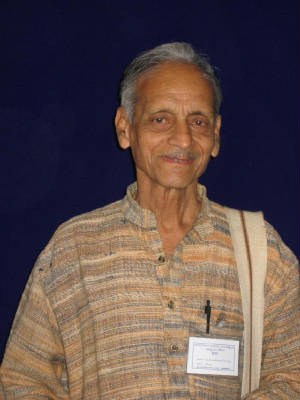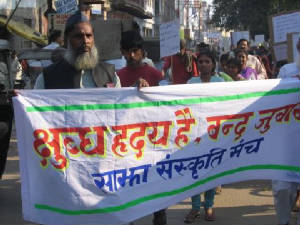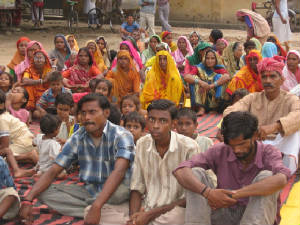|
The Opposition to Coca Cola
and Water Privatization |
| by Gina Drew and Mike Levien; July 25, 2006 |
On July 1, 2006, in the Indian town of Medhiganj in the state of Uttar Pradesh, the resounding cry was “Coca-Cola band Karo!” (shut down Coca-Cola!). Demanding the closure of the Coca Cola factory across the street, some 500-1000 people gathered to support the end of a five day fast by local activists Nandlal Master and Mukesh Kumar and to lament the extraction of 2.5 million liters of water a day from the bottling plant. In a region suffering from the failure of three successive monsoons, villagers spoke of their water woes and the exploitative and polluting practices of the Coca Cola factory. Behind the protestors, sown seeds threatened to expire in parched fields due to late rains and a lack of ground-water for irrigation.
Part of a three-year opposition against the Coca Cola factory, the July 1st rally marked the 100th day of a dharna (sit-in), which grew to become a “relay” fast before becoming a complete hunger strike. The fast was taken up only after protestors received unsatisfactory responses from government officials to community demands, articulated by the local organization Lok Samiti. Despite the findings of the Central Pollution Control Board (CPCB) in 2003 that sludge originating from the factory contained hazardous levels of cadmium, lead, and chromium, the government failed to take assertive action against the Mehiganj bottling plant. Other than refraining from its earlier practice of panning off their waste as fertilizer, the company has not made any significant strides to comply with the CPCB’s demand that they properly treat and store the toxic byproducts of cola production. In the land of milk and yogurt, says one of the community’s slogans, there is no place for Coca Cola.
Beyond calling for the closure of the bottling plant and the cancellation of its license to operate, Lok Samiti and its supporters are adamant that they will not stop their opposition until the Coca Cola plant meets a number of additional demands. Among these are that the company pay adequate compensation to villagers whose fields were flooded by the bottling plant’s toxic, crop-and-soil destroying wastewater. In 2003, a large release of toxic water ruined between 25 and 50 acres of formerly fertile land and made villagers sick with numerous skin and stomach ailments. Villagers are also demanding the return of 1/3 an acre of public Panchayat (village government) land upon which the company illegally built part of its bottling facility; the dismissal of all cases filed against the peaceful protestors who have been arrested, beaten, and jailed in the course of the struggle; and the prompt payment of Rs 3 Crore 1.5 Lakh (USD 650,000) which the company owes the government, after being found guilty in 2003 of evading a stamp tax.
To show their solidarity with the struggle, social movements from across the country associated with the National Alliance of People’s Movements (NAPM) came to support the community’s fight against Coke, whose opposition is seen as part of a larger struggle against water privatization and neo-liberal globalization more generally. In attendance to give their support to the local community were grassroots people’s movement’s leaders such as Medha Patkar of NAPM and the Narmada Bachao Andolan, the anti-dam struggle in the Narmada Valley, and Sandeep Pandey of Asha and NAPM. Patkar related the experience of villagers in Plachimada, Kerala who have been suffering similar abuses from a local Coca Cola bottling plant and have so far been able to shut down the plant’s operations through their persistent agitation. She called for a broadening of the struggle and a coming together of movements from across the country to resist water privatization and neo-liberal globalization. Pandey related to the villagers the successful efforts by students in the U.S. to force their universities to cancel exclusive contracts with the Coca Cola company. He called for a global struggle against the multi-national behemoth, widely seen as one of the most potent symbols of global capitalism. Labeling Coca Cola a water thief, speakers such as Aflatoon of the Samajwadi Jan Parishad pointed out the dangers of privatization and the need to protect and ensure community access to water resources across the country and globe.
To demonstrate that they not only resist the privatization model but have a positive alternative vision of water use and development, the movements gathered early on the morning of the protest to build a water-catchment pond for the village. Chanting, “Garmiyon mein samaye, sukha hame yahi sikhaye” (this is what we’ve learned from summer droughts) the villagers and their supporters worked to replenish the local water table as they chipped through the dusty ground with shovels in the blazing heat to build a water harvesting pond. Instead of large dams and water privatization, which expropriate resources from local communities, the movements are calling for more decentralized and community-based forms of water harvesting and management. Grassroots movements and NGOs across India, including the well-known efforts of Rajendra Singh in Rajasthan, have shown community water harvesting and management to be a viable way of ensuring water security. This vision of water is part of a larger alternative development vision that calls for community control over land, forest, and water to prioritize meeting basic needs over corporate profits.
The struggle against Coca-Cola and the expropriation of community water supplies by private interests continues to grow in India. Already there has been a notable victory with the successful closure in 2004 of a Coca-Cola bottling factory in the parched, tribal region of Plachimada, Kerala where studies first confirmed the depletion of water supplies and the contamination of water and soil due to Coke’s dumping of toxic wastewater. Encouraged by the organization and solidarity of community members in Plachimada, Mehdiganj, and Kaladera (in Rajasthan), other communities across India are lending their support and actively opposing the construction of new factories in their localities. These movements are joining forces with people’s movements resisting large dams and other destructive water projects, like India’s proposed Interlinking of Rivers Project, which would involve major cross-basin water diversions between 30 major Indian rivers. Groups from across India have been meeting at regional gatherings to discuss and formulate a strategy of resistance to this grandiose and potentially catastrophic project. These movements also see the need for and are trying to build a more systematic struggle against neo-liberal globalization generally, of which water privatization is one part. Towards this end, the National Alliance of People’s Movements is bringing together people’s struggles from across the country that are in varying ways being marginalized and dispossessed by neo-liberal policies and are working for a more equitable, democratic, and ecological vision of development.
In the United States, word of the plight of Indian communities—along with the unmasking of Coca Cola’s support for murderous anti-union paramilitaries in Colombia—has encouraged American citizens to voice their support and call for an end to the company’s unjust practices. As noted above, numerous universities across the U.S., students are forming coalitions to ban Coca Cola from their schools or have the company’s exclusive contracts revoked. This growing alliance across borders and cultures presents an opportunity for activists around the world to unite against one of the most potent symbols of neo-liberal globalization. A multi-national menace like Coke calls for multi-national resistance to defend labor rights and the life and livelihoods of rural communities.
Gina Draw is a Graduate Student in Anthropology
at the University of North Carolina-Chapel Hill
Mike Levien is a Graduate Student in Sociology at the University of California-Berkeley







